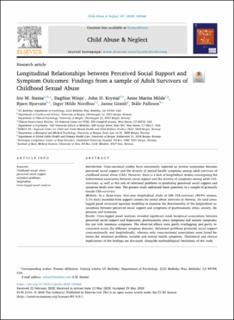Longitudinal Relationships between Perceived Social Support and Symptom Outcomes: Findings from a sample of Adult Survivors of Childhood Sexual Abuse
Steine, Iris Mulders; Winje, Dagfinn; Krystal, John H.; Milde, Anne Marita; Bjorvatn, Bjørn; Nordhus, Inger Hilde; Grønli, Janne; Pallesen, Ståle
Journal article, Peer reviewed
Published version

Åpne
Permanent lenke
https://hdl.handle.net/11250/2753428Utgivelsesdato
2020Metadata
Vis full innførselSamlinger
Originalversjon
International Journal of Child Abuse & Neglect. 2020, 107, 104566. 10.1016/j.chiabu.2020.104566Sammendrag
Cross-sectional studies have consistently reported an inverse association between perceived social support and the severity of mental health symptoms among adult survivors of childhood sexual abuse (CSA). However, there is a lack of longitudinal studies investigating the bidirectional association between social support and the severity of symptoms among adult CSA-survivors, as well as the role of relational problems in predicting perceived social support and symptom levels over time. The present study addressed these questions in a sample of primarily female CSA-survivors. Methods In a three-wave, four-year longitudinal study of 506 CSA-survivors (94.9% women, 5.1% men) recruited from support centers for sexual abuse survivors in Norway, we used cross-lagged panel structural equation modeling to examine the directionality of the longitudinal associations between perceived social support and symptoms of posttraumatic stress, anxiety, depression and insomnia. Results Cross-lagged panel analyses revealed significant weak reciprocal associations between perceived social support and depression, posttraumatic stress symptoms and anxiety symptoms, but not with insomnia symptoms. The observed effects were partly overlapping and partly inconsistent across the different symptom domains. Relational problems predicted social support cross-sectionally and longitudinally, whereas only cross-sectional associations were found between the relational problems variable and mental health symptoms. Theoretical and clinical implications of the findings are discussed, alongside methodological limitations of the study.
